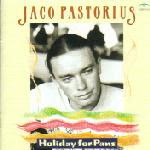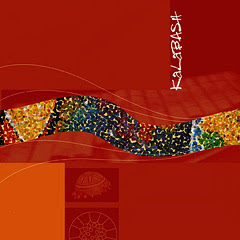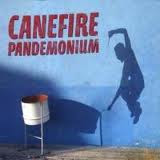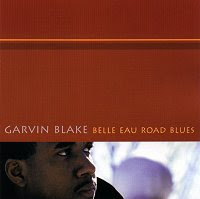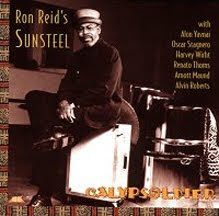Maestro Paul "Pablo" Campbell pass away on Monday 21th May 2012. He arranged for Cordettes Steel Orchestra from the 60s to 90s, winning the music festival in 1967 un-sponsored category. In 1968 they placed 2nd and placed in the top 3 afterwards. He also arranged for Single Pan Bands like Nostalgic, North Eastern All Stars, Sipabatt to name a few. He tutored Tamana Pioneers from the 1982 until 2011 when he got ill. The first time the band placed in the Panorama competion, they placed 3rd in the Small Band Category and 2nd in the last Music Festival Ensemble Category. Today at 4:00pm Sponge from Cordette will be on 95.5 fm radio. Tonight from 8:00pm at Cordettes Pan Yard, they are having a musical concert, with bands like the resident band, Tamana Pioneers, Sipabatt to name a few. Tomorrow night at his home in Valencia, Tamana Pioneers will be performing. The funeral takes place on Monday 28th at the RC church Valencia at 1:00pm.
All Posts (7)
The members of Sangre Grande Cordettes in collaboration with the tamana pioneers steel orchestra and other steelbands that Pablo arranged for will be hosting a tribute to him at the cordettes pan yard this afternoon. Starting at 8:30pm188585_1019752386454_1604510467_48163_4268_n.jpg
Having played steel pan for 10 years (I was a late-starter!!) and fallen in love with the instrument, it makes me really sad to see that so few schools in my area have steel pan. I really wanted to be able to give children the chance to have a go in the hope that I can inspire a new generation of players in my home town.
I've managed to get together a small set of steel pans and having run a workshop with a nearby scout troop, I placed them in a local secondary school (ages 11-18). The teachers and the children love them and they have already used them in concert as a steel band in their own right but also in combination with the school orchestra (which sounded amazing).
So far in the few months that my project has been going, over 1500 people have had a chance to play who wouldn't otherwise have had the opportunity. I hope that in the new school year I'll be able to move on and work with more schools and local community groups. In the meantime, please take a look at my website www.pan-jam.co.uk and like my Facebook page of the same name.
My ultimate aim is to promote the instrument to a whole new audience and spread the love of pan in my community :)
Hey everyone, the steelpan has a chance to win this contest. Vote and spread the word so people will start to see the tip of the steelpan iceberg!
Here's the link:
I was recently at an event for the Borough Day celebrations in Point-Fortin. There I witness the treatment of one of our foremost pan tuners; a Chaconia Medal receipient, being turned away at a Pan event. Now I understand that this event was sponsered by a private company, however Pan Trinbago was involved. His name was not on a list by the door, an oversight by the individual who invited him. There were officials from Pan Trinbago at the door and none could vouch for Mr. Kellman, who I am sure was humilliated by this action. A Pan compitition out front and most of the "invited guest" in the back partying, eating and drinking, while several of the performing bands, their instruments were made by guess who? Mr. Kellman. We are too small as a society to allow our icons to be treated this way. Dont wait untill they are no longer with us to give them their due, moments of silence, big shows of appriciation. They need to feel the love now, while they are still with us. Let us cherish and respect them for the contributions they have made and continue to make to put our country on the world stage. This has been said time and again, however I feel that it should be said as many times as this sort of nonsense occur.
Trombonist Reginald Cyntje (pronounced sin-chee) and pannist Victor Provost represent, to me, an opportunity to understand the connection between Caribbean jazz and the USVI as a locus of the New World African music from a social and critical perspective. Both these musicians were raised in the US Virgin Islands, before migrating to the mainland US for music training and careers in jazz. That early influence, without the distance of "independence" that other Caribbean jazzists have, marks a point of reference to understand the recent output of these two Washington, DC based musicians. Music scholar Warren R. Pinckney Jr. investigated the interrelationship between the mainland and the Virgin Islands jazz scenes in his 1992 essay "Jazz in The U.S. Virgin Islands", and he observed that:
Music scholar Warren R. Pinckney Jr. investigated the interrelationship between the mainland and the Virgin Islands jazz scenes in his 1992 essay "Jazz in The U.S. Virgin Islands", and he observed that:
After purchasing the islands in 1917, the United States set out to "Americanize the people of the Virgin Islands," primarily by introducing American-style public education. An indirect outcome of this Americanization, coupled with influences from various Caribbean islands such as Cuba, Trinidad, and Puerto Rico, was the discouragement of native Virgin Islands culture...The Virgin Islands and mainland United States jazz scenes have a fundamental mutual relationship: the American jazz scene provides the models upon which local players base their performance styles,and the Virgin Islands jazz scene provides new performance venues for American players.
Pinkney Jr., Warren R. "Jazz in the U.S. Virgin Islands." American Music, Vol. 10, No. 4 (Winter, 1992), pp. 441-467. Web. 9 Sep. 2010
These two Virgin islanders, one using a western canonical instrument, the trombone to create island inspired jazz whilst the other, using an "island instrument" to interpret bebop make for an interesting comparison. Reginald and Victor were reared in Saint Thomas and Saint John respectively (Reginald was born in Dominica and moved to St.
Thomas at 2 months), and the institutions and educational influences there in the 1970s may have played a part in their decision to play jazz as opposed to say soca, calypso or other imported pan-Caribbean music style. The social environment in the USVI with its heavy emphasis on American tourism relegates jazz in America's Caribbean Paradise as accompaniment for "Caribbean warmth, both the weather and the people" as one blurb states. As Warren Pinckney said elsewhere,"In the U.S. Virgin Islands, jazz has historically been an economic component of the considerable tourist industry upon which to a large extent the country's economy depends." This combination of education and economic influences, plus the unique relationship between St. Thomas and St. John, as opposed to St. Croix piqued my interest, and allows me to combine the reviews of these fine musicians.
 |
| Reginald Cyntje. © eddywestveer.com |
Reginald describes his album "Freedom's Children"thus: "This CD will paint a colorful musical landscape that will take you from drinking your favorite wine at an elegant jazz club to enjoying a refreshing daiquiri on a beautiful Caribbean beach." This blurb coincides with the research of Pinckney, and foretells the mindset of this trombonist, and his marketing strategy. The metaphor of the Caribbean, "as a place to flee...seriousness" as so eloquently described by Derek Walcott is mirrored in Reginald's self-description of this CD. Elsewhere, Reginald elucidates on the CD's theme: "After the parade of innocence passes, the roller coaster of life begins." That juxtaposition of carefree whimsy with deep analysis and substance can be a theme of the overall effect of this CD on this listener. This CD has music for dancing, for celebrating, for remembering elegance and pride in our Caribbean glory.
Trinidadian trumpeter Etienne Charles once told me, "Calypso is one of the ways we celebrate freedom, Jazz is another...and my one rule is that there are no rules...that's freedom."Freedom's Children is Caribbean Jazz! Reginald incorporates Virgin Island melodies, traditions and rhythms and weaves a musical statement closer to his expanded thesis than his marketing cliché. Rather than being a pastiche of anything-goes island vibes, the musicianship and sonic ideas by Reginald and his band of USVI expat musicians feed into a trend of re-charting the ruins of lost cultural
memories. World fusion experiments have had a storied history in the jazz canon and industry, but listeners with ears turned toward the tropical latitudes would not be indifferent at the trombone's rise as a musical voice in the Caribbean, jazz precedence notwithstanding.
 |
| Victor Provost |
Victor's website posits that, "[he] is one of a handful of pan players in the world who have incorporated a Bebop foundation into his playing, and arguably, the only one who has expounded on that vocabulary
with a modern sensibility and style." We may beg to differ on the hyperbole, and I am sure Annise Hadeed and Rudy Smith may have something to say about that. I can attest that he does understand the bebop fundamentals and the sound of the pan in the milieu of a swinging bebop band is refreshing in the current landscape of post-bop, pseudo-jazz dominance.
"Her Favorite Shade of Yellow" wanders through the field of jazz standards, placing the steelpan in the centre of a conversation heretofore reserved for other instruments of the jazz big band. Once a jazzman gets his hands on a traditional instrument, it is forever changed; the trumpet, saxophone, and piano will never be narrowly assessed as instruments of the western classical canon. His technique is strong, the improvisation interesting and informed, and the assuredness of the self-composed title tune, places Victor immediately into the upper echelons of the pannist's pantheon both in the Caribbean, specifically Trinidad and Tobago, and in the US. This is a worthy purchase that highlights the evolution of the steel drum from jangly rhythm maker in post WWII Trinidad to lead instrument on a growing number of CDs produced here in the Caribbean and importantly, in the US, both as a signifier of a Caribbean ethos and as melodic charmer with range and tone to embrace varied musical styles.
This CD, however, illustrates frustratingly to me that our Trinidadian pannists are not recording music, of quality and with frequency, to make the sound of the steelpan more universal. A sad fact, for this listener is that the most prolific steelpan recording artist is an American. Victor and other US pannists like Jonathan Scales are challenging the sound of the pan in "non-traditional styles", and in so doing creating new ears which will have a critical commercial role in identifying the steelpan sound in the marketplace. The Panorama tune, while effectively composed for orchestra, is never treated as a piece for interpretation by ensembles smaller than large orchestras.
This pair of musicians should be rewarded by commercial validation for their respective appreciation of Caribbean-ness despite the cynicism of the regional politician or metropolitan critic. Their journeys, though similar in one sense, have taken the idea of Caribbean Jazz from different perspectives by instrument choice and jazz sensibility to this point. Andre Tanker's "Forward Home" has lyrics that speak to his sojourn in the US thus:
I went away
I leave and I come back home
I come back to stay
I must see meh way.
The spiritual return to "come back to stay" is a commonality of Caribbean artists who have made it in the metropole. Fellow USVI ex-pats on the US mainland such as Dion Parson, Ron Blake and Reuben Rogers attest to the need to have their footprint in both locales; the US for enhanced education and financial opportunity, and the Caribbean for
influence and cultural validation. Like fellow USVI expat, Sonny Rollins a generation or two before, the mainstream serves as a platform for Caribbean innovation within limits offered by an influencing audience. These two Saints have really come marching in. Reginald and Victor continue the tradition of the many music merchants from the islands before. We look for wider availability of their product in CD form here as we celebrate.
I was recently re-animated about the possibilities of programming 24 hours of steelpan jazz and its variants for online radio, when I had to do a little research into the output of this sub-genre of our Caribbean jazz fusion experiment. Some hard realities; we had a proliferation of CDs during the1990s, both in Trinidad and Tobago and abroad, mainly North America. A smattering of offerings out of the UK and Europe did not hold much sway as we entered the 21st century. As a programming niche, there is a thin line between repitition and redundancy.
There is a sort of renaissance in music recording now from the US, by non-Trinidadians as well as diasporic citizens, but the quality varies with level of music academic qualifications. Two names stick out, Phil Hawkins and Gary Gibson, both offering two and four CDs respectively in the 2000s, leaning to what Andy Narell, among others, has termed "progressive steelpan jazz": jazz-based, harmonically intricate music. To quote a review for one of Gibson's CDs: "Speaking a language of harmonic depth not previously explored within the steelpan community in recorded music, Gibson's compositions provide an excellent springboard for improvisations." Both these West-coast musicians attempt to be innovators of music for steelpan. On the east coast of the US, ex-pats Liam Teague and Leon Foster Thomas are creating variety, Victor Provost recently premiered with bebop stylings, while JAOTG alumnus Jonathan Scales released his third CD of musically complex and outside the box compositions. One critic noted, "the music on Jonathan Scales' [three CDs] defies the conventional parameters of jazz or even "pan-jazz" and pushes composition to unprecedented levels of complexity and sophistication."
Local steelpan recordings seem to revolve around ensemble performance by a whole band, with few offerings by our greats: Boogsie, Professor, Ray. Robbie Greenidge, with his collaborations with Michael Utley of Jimmy Buffett's Coral Reefers Band, has about over a half-dozen CDs, now and then veering towards his boss' carefree tropical blend devoid of the native rhythms that inform Caribbean jazz. I look and listen with keen interest at young Kyle Noel's upcoming offerings. This Trinidad southerner, far from the madding crowd has interesting musical and sonic ideas, and it would be an excellent fillip for the inventors of the PHI to get that instrument into his hands.
Hoping and believing that quantity and quality are what drive a music industry, I look, and wait with bated breath for the day when we get our act together here in the Caribbean, to make that statement that we made years ago when Caribbean people challenged the idea that there was music other than rock 'n' roll that was chart-worthy in the US. Belafonte was a catalyst then, but not a sustainer. It is said that Andy Narell is the equivalent catalyst for the steelpan. Only excellent output will sustain. [Listen to the exfm stream of some collected music here.]






